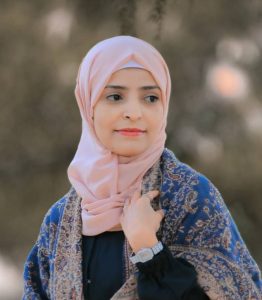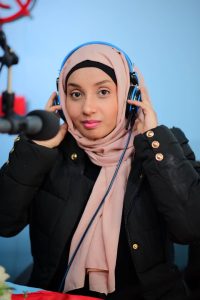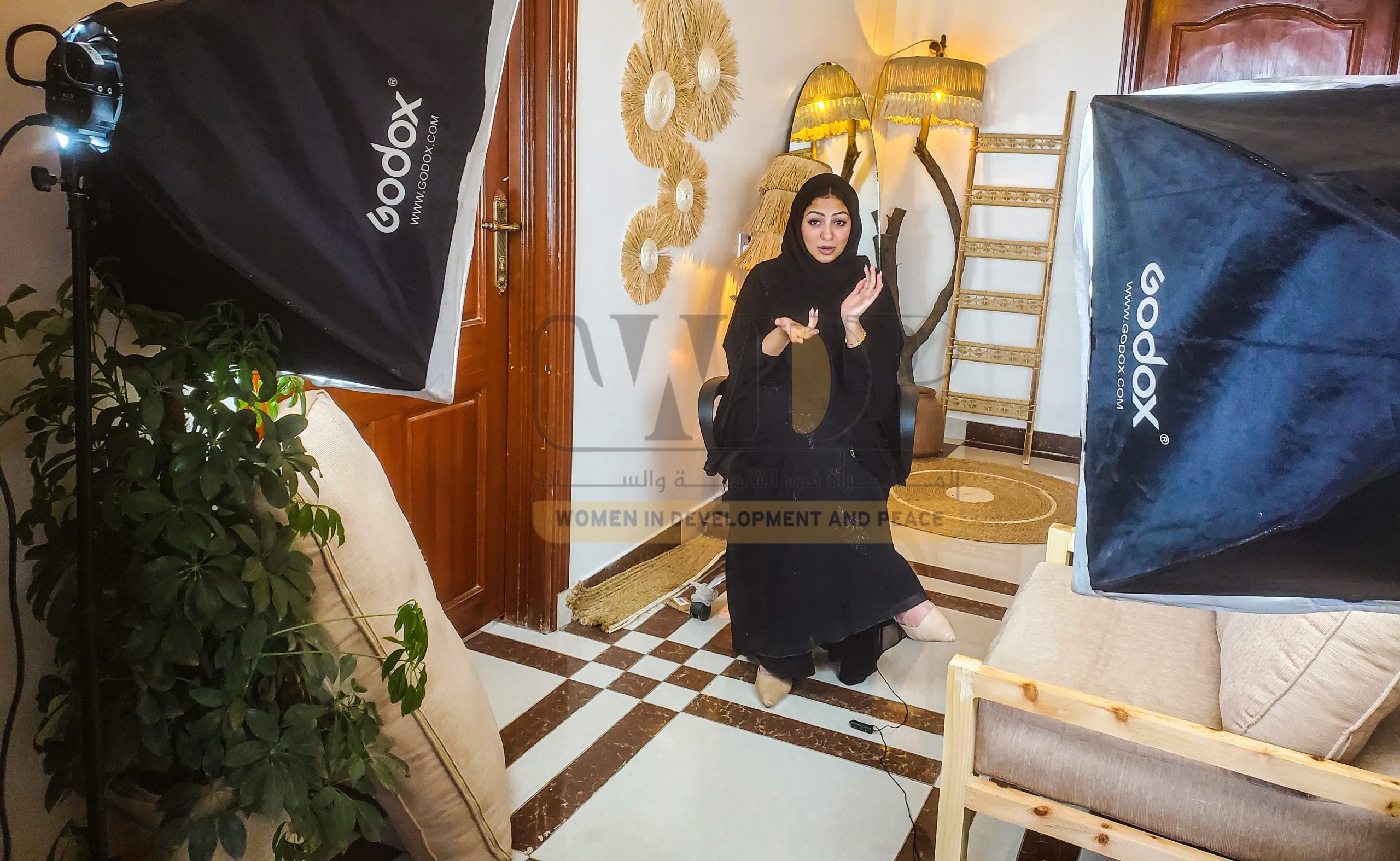Women in Development and Peace – Ahmed Bajoaim
Amid the economic contraction and its frightening decline as a result of the armed conflicts in Yemen, which have cast their shadows on all aspects of life, female journalists play a significant and effective role in supporting the local and family economy. Despite the many difficulties faced by Yemeni girls in entering the field of media due to cultural and societal challenges that view women as unqualified for work in this field, female journalists have made tremendous efforts in showcasing family projects to the audience.
Many local products have been introduced to the community by female journalists, encouraging their acquisition. This contribution of female journalists supports the local economy and encourages families to engage in production. The role played by working women in the fourth estate in enhancing societal awareness for achieving sustainable economic development is important and necessary. Furthermore, female journalists have the ability to shed light on the economic issues of local productive families and their role in providing income. This detailed report provides insight into the role of female journalists in supporting the local and family economy.
Coverage of Archaeological & Tourist Sites
 Raga Tairmana, a media professional and program director at “Alwan FM” radio, believes that women are the essential core in the media circle, serving as an economic support for families and the community through media coverage and active social media engagement. This includes continuous promotion of local and national products, marketing and introduction of women’s handicrafts and family products, as well as highlighting the importance of the local economy and family products in media conferences and extensive meetings. Additionally, it involves promoting the positive aspects and encouraging families and individuals to support national products.
Raga Tairmana, a media professional and program director at “Alwan FM” radio, believes that women are the essential core in the media circle, serving as an economic support for families and the community through media coverage and active social media engagement. This includes continuous promotion of local and national products, marketing and introduction of women’s handicrafts and family products, as well as highlighting the importance of the local economy and family products in media conferences and extensive meetings. Additionally, it involves promoting the positive aspects and encouraging families and individuals to support national products.
She adds that coverage highlighting historical landmarks, such as radio and television programs, social media content, events, and bazaars in tourist destinations like Old Sana’a, Shibam Kawkaban, Dar Al-Hajar, and others, is crucial in boosting the economic status of local and national products, and making historical sites a support and resource for the national economy.
Journalist Hawida Salim says that one of the responsibilities of a female media professional is to provide information relevant to families and local communities about job opportunities, investments, small businesses, and local projects. This includes highlighting local projects and initiatives that contribute to the local and household economy, as well as showcasing success stories of women in business and local projects. Furthermore, media coverage of tourist and archaeological sites significantly boosts the local economy. Promoting these attractions through various media channels such as TV and radio ads, print media, and social media helps improve the infrastructure of these sites, contributing to economic development.
Media professional Alia Abdallah emphasizes the important and diverse role of women in the media in supporting the economy. This is achieved through discussing small projects managed by women and housewives, as well as highlighting various aspects of their products and work through TV reports or special media coverage. Additionally, shedding light on working women and successful female entrepreneurs who may not have been previously recognized in society encourages women to participate in economic activities. The media continuously supports women in innovation and creativity, discusses related issues, and seeks solutions and proposals to enhance their role in this aspect.
Regarding coverage of tourist and archaeological sites, there is a tangible role for female media professionals in this area. For example, in Hadhramaut, girls work on documenting tourist sites and seasons, such as the “tourist town” season that attracts visitors to the city of Al-Mukalla from all Yemeni governorates and neighboring Arab countries. This is achieved through media coverage in which women participate, introducing the public to this tourist season. Many girls who cover tourist and archaeological sites do not work in media outlets, but they contribute to promoting these attractions, which will support the national economy through their social media pages.
On her part, the media professional Fatima Bafutaim explains that the role of women in media coverage of tourist and archaeological sites lies in promoting and marketing these places and attractive landmarks for local tourism, and possibly for international tourism in the future after the establishment of peace in Yemen. The female media personnel may also target malls and women’s private parks during their coverage. Their role through social media platforms or TV and radio programs is important, through awareness campaigns, brochures, podcasts, and more. It is now noticeable that many online food, clothing, and decoration stores are spreading, which serves as a source of income for families.

Similarly, the media professional Samar Al-Azraqi stated that the role of female media personnel lies in supporting the local and family economy by providing the community with necessary information about the national economy, important changes, emerging projects, opportunities, and economic investments. Additionally, they contribute to the coverage of archaeological and tourist sites through various media channels and social media platforms, emphasizing their role in all aspects of life, such as supporting the local economy and productive families. Furthermore, Yemen is rich in archaeological and tourist landmarks, and it is the responsibility of Yemeni media to highlight them as a significant economic asset for the country if utilized correctly.
Types of Programs
Program Quality Media professional Raga Tairmana described that programs focusing on supporting the national economy and family production by female media personnel are often carried out through new media platforms. As for TV or radio programs, there may be weekly programs supporting this field or the economic aspect may be included in related programs. Time may also be allocated during events or seasons, such as the International Coffee Day, where Yemenis take pride in their coffee, considered one of the best Yemeni crops, and women can showcase these products through their program coverage, whether for the three media channels (TV, radio, press) or through social media platforms.
Journalist Hawida Salim pointed out that the type of programs that female media professionals work on in this field include local community radio programs that focus on family and society, as well as specialized programs for women on television channels or official radio stations. Additionally, they work on programs that promote the economy by showcasing success stories or successful development projects. Social media platforms such as TikTok, Facebook Reels, YouTube, Instagram, and WhatsApp have also provided a significant space for female media professionals to support productive families and present them to the audience.
In the same context, journalist Alia Abdullah noted that the type of programs female media professionals work on allow them to create television reports or host television programs that explore tourist and archaeological sites. They also have the opportunity to conduct interviews with important figures and experts in this field or enthusiasts. Female media professionals can also provide promotional content to viewers, market local products and support them, and promote educational seminars and workshops in this field.
Furthermore, some programs target specific groups, such as elementary or high school students, and involve field trips to raise awareness about the importance of supporting the national economy and domestic production, as well as developing this culture among them and introducing them to the archaeological and tourist sites abundant in Yemen. This is a task that female media professionals are more suited for than men because they have the ability to reach young girls. Additionally, female media professionals can, through their professional programs or social media pages, target handicraft producers, production processes, and cover them live and directly.
Media figure Samar Al-Azraqi points out that one of the most important programs she worked on is the “Morning of the Capital” program, which focuses on the tourism aspect, on the “Awareness” radio affiliated with the Capital City Authority. As a media figure, she focused on covering many different tourist areas in the Yemeni governorates in the segment “This is Yemen” within the program. In addition, many social and economic programs support local production, enhance its position, and highlight the most prominent success stories in the investment field, whether for productive families or others, contributing to the enhancement and development of the Yemeni economy.
Plans & Recommendations
Media figure Raga Tairmana believes that one of the most important future plans, as well as recommendations, for female media figures to support the local and family economy is to provide them with the opportunity to participate in everything related to the local economy and to support their presence in all training, educational, and awareness programs. This will serve as a foundation for raising the level of media and increasing feminist media campaigns about productive families, which are the category most in need of media support, as their work mainly takes place at home and through social media (new media). Therefore, supporting this category and promoting its products on social media is a significant contribution made by the media to the local economy.
Hawida Salim mentions a set of future plans and recommendations aimed at improving the media support provided by women in this profession for the local and family economy. These include implementing quality and continuous training programs to improve the performance of female media figures in this aspect, developing their skills in writing promotional content, and ensuring follow-up by the implementing bodies of the courses the media figures have taken, and applying them in reality. In other words, educating female media figures in this field so that they can support the national and family economy in modern and advanced ways.
Alia added, “This field must be taken care of by enhancing local trade, purchasing national products, supporting local companies and projects, regulating and coordinating local markets and stores, encouraging innovation and entrepreneurship, promoting local heritage and tourist sites, and supporting family projects. This can only be achieved through the combined efforts of both male and female journalists, as well as individuals from other sectors such as tourism, museums, antiquities, marketing, industry, and commerce. Additionally, it is the responsibility of the business owners themselves to develop their businesses, understand market requirements, and study them, which also applies to productive families.
On the other hand, Alia Abdullah points out that women in general, not just female journalists, are trying to keep up with the developments of the time and have the most information and current events. Therefore, investing these capabilities in supporting the local and family economy will undoubtedly give a strong boost to improving the economy, whether at the family level or in promoting heritage and tourism, provided that these entities invest in these capabilities correctly and lead them toward the common national goal.
Ultimately, Yemeni female journalists are a symbol of strength and empowerment in the face of the economic challenges that the country has faced in recent years. They have become key players in alerting the public and directing them towards sustainable economic solutions. The role of female journalists is not limited to publishing journalistic materials, but extends to developing the local economy towards achieving self-sufficiency in the face of the shortages we see today. Therefore, continuous support for their efforts is necessary to promote the local economy and achieve comprehensive development in Yemen.

